November saw the first World 100 in-person event since the end of 2019 when members and other delegates came together for the World 100 Conference in Manchester. ‘World 100 Live’ was the destination of this meeting; a special event designed for members to share insights and experiences from their university since we last met.
Although not part of the conference itself, World 100 Live was held alongside THE Campus Live, in the same venue, giving delegates the chance to attend both events and learn from a wide range of experts, both from within The World 100 Reputation Network itself and the wider sector.
Our session started with a networking lunch, where THE Editor, John Gill provided observations on the challenges the sector is facing and how, in many cases, universities are handling them positively. The subsequent discussion involving members covered topics ranging from free speech to policy changes and the importance of building a strong reputation for equality, diversity and inclusion.
Members can view W100 Live resources here, including a full recording of the session and PDFs of presentations.
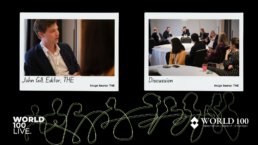
A Reputation for Sustainability
The first W100 Live session focused on reputation and sustainability, and in particular, activities W100 Member universities had been doing around key recent global conferences and events. Rachel Sandison, Vice Principal, External Relations, of University of Glasgow shared the ways in which the university capitalised on and collaborated with the COP 26 conference. She described Cop 26 as “a compelling platform to share their ambitions for net zero, our sustainability agenda and our reputational objectives more widely”.
Whilst World 100 Live was the first chance for World 100 Reputation Network members to come together for a face-to-face event, Rachel reflected that COP26 had been a ‘baptism of fire’ when it came to being back in public events as the university had held over 200 events during its duration.
University of Glasgow’s activity in the run-up to and during COP26 was vast. As well as the 200+ live events, all the sustainability content from across the university was brought together in on one digital hub . Other key reputation activities included the spotlighting of key academics working on sustainability related research, the creation of a directory of experts for media content, and programmatic advertising with Times Higher Education, Research Gate and New Scientist.
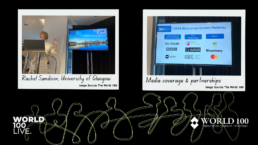
Rachel was followed by Garth Davies, Head of Press and Public Affairs at University of Exeter who spoke about a similar focus provided by the G7 Summit in Cornwall, when their Green Futures campaign was launched. Like Glasgow, the University of Exeter built their campaign plans and activities on strong sustainability foundations and credentials.
Green Futures was created as an umbrella brand to allow the university to talk about the full range of their expertise and work in the field. Exeter also looked at the specific agenda for the G7 summit and collated and produced content specific to those areas.
As well as video content outlining the university’s mission and work, Garth detailed media campaigns run in partnership with other institutions such as The World Health Organisation, The Department for Environment, Food and Rural Affairs, Cornwall Council, the UK Space Agency and more. This led to opportunities to feature spokespeople such as astronaut Tim Peake, former UK Prime Minister Gordon Brown, and even Prince Charles and Billie Eilish.
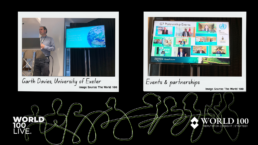
Defining Reputation
The third speaker at World 100 Live was University of Navarra’s Director of the Reputation Unit, Santiago Fernández-Gubieda who spoke about his Doctoral thesis research focused on understanding university reputation using the Delphi technique. Sharing initial insights from his research, Santiago compared the search for reputation as a ship searching for the holy grail.
Within his research Santiago was able to define university reputation as the following:
The set of beliefs, perceptions, and attitudes (positive or negative) with which stakeholders recognize the nature and academic performance of a university insofar as it has, or has not, met their expectations over a period of time and in a particular environment. These beliefs, perceptions, and attitudes, if favourable, result in stakeholders making decisions or supportive recommendations.
Santiago was also able to define a ranking of the most influential stakeholders for reputation, based on data collection and interviews he had done with his group of experts. This list put internal stakeholder groups in the top 5 places, with academic staff in first place. This finding reflects Santiago’s opening statements that reputation is born from within a university and then manifests amongst its stakeholders.
From his research Santiago was able to identify 5 areas of intelligence that reputation can bring to university governance and management;
- Aspirational intelligence: Helping the university to move towards a shared purpose and clarity of its mission.
- Relational intelligence: Listening systems allow us to know the change in perceptions, orient their expectations and anticipate possible crises.
- Transforming intelligence: Making decisions taking into account perceptions, taking actions to improve the organization based on its expectations and relations with stakeholders.
- Creative intelligence: As a result of this listening, the organisation opens up to a process of innovation and openness.
- Social intelligence: Ensuring that the university obtains social licence to operate; that stakeholders and the university are in harmony.
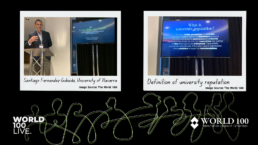
The Reputation Opportunity
Finally, we heard from our own Mark Sudbury (Head of The World 100 and Reputation) who shared insights from the Network annual research project for 2020-21. The project looked at whether universities had been able to leverage reputational gain from the high profile of academic faculty and research during the pandemic. The full report will be made exclusively available for members very soon but some brief insights from the research project will be available on the research page in the next few weeks.
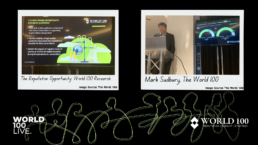
Want to continue reading?
The rest of this content, and much more, is only available to our members. Consider becoming a member today…
If you are already a member please login to view this content.
Download the Presentations
PDF: Rachel Sandison's W100 Live Presentation
PDF: Garth Davies' Presentation from World 100 Live
PDF: Santiago Fernández-Gubieda's presentation from World 100 Live
The Reputation Opportunity - World 100 Live Presentation

